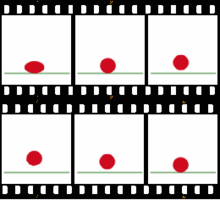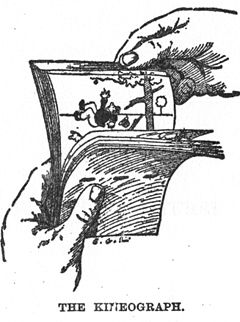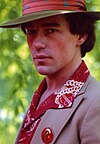
Back بوابة:رسوم متحركة Arabic دەروازە:ئەنیمەیشن CKB Portal:Animation German درگاه:پویانمایی Persian Portail:Animation French Portale:Animazione Italian Portal:アニメ Japanese 포털:애니메이션 Korean Portal:Animação Portuguese Портал:Мультипликация Russian

| Main | Categories and topics | Tasks and projects |
Introduction
Animation is a filmmaking technique by which still images are manipulated to create moving images. In traditional animation, images are drawn or painted by hand on transparent celluloid sheets (cels) to be photographed and exhibited on film. Animation has been recognized as an artistic medium, specifically within the entertainment industry. Many animations are computer animations made with computer-generated imagery (CGI). Stop motion animation, in particular claymation, has continued to exist alongside these other forms.
Animation is contrasted with live-action film, although the two do not exist in isolation. Many moviemakers have produced films that are a hybrid of the two. As CGI increasingly approximates photographic imagery, filmmakers can easily composite 3D animations into their film rather than using practical effects for showy visual effects (VFX). (Full article...)
Selected article
Phineas Flynn is the main protagonist of the animated television series Phineas and Ferb. Voiced by Vincent Martella and created and designed by Dan Povenmire, Phineas first appeared along with the rest of the series' main characters in the pilot episode "Rollercoaster." Phineas, along with his stepbrother Ferb Fletcher, star in each A-Plot of every episode. The series concerns Phineas's attempts to avoid boredom by finding something new to do every day of the summer vacation. His sister's name is Candace Flynn, who tries to reveal their outrageous creations, but to no avail. It is also said in Phineas and Ferb's "Quantum Boogaloo" that he had won the nobel prize, as he was in Switzerland at the time for the "award ceremony". Phineas comes from a blended family. The creators chose this arrangement because they considered it underused in children's programming as well as from Marsh's past experiences in one. As a character, Phineas has received a positive critical response, with one reviewer describing him and his brother as a "comical pairing." Phineas appears in Phineas and Ferb merchandise, including plush toys, t-shirts, and a video game.
Selected image
Did you know (auto-generated) -

- ... that, for the animated film Us Again, director and writer Zach Parrish considered a video of an elderly couple dancing to be visceral and ideal inspiration?
- ... that the Pakistani film Shehr e Tabassum was the first animated cyberpunk film to be made by an Urdu development team?
- ... that Encanto's Isabela Madrigal was animated to be aware that she is "always on stage"?
- ... that the animated film The Exigency took thirteen years to make?
- ... that "Arnold's Christmas", now considered one of the most memorable episodes from the animated series Hey Arnold!, was almost rejected by network executives because it depicted the Vietnam War?
- ... that the creators of the cartoon Jade Armor filmed live-action martial arts stunts to visualize the show's animated action sequences?
Selected quote
Selected biography
Phil Hartman (September 24, 1948 – May 28, 1998) was a Canadian-born American actor, comedian, writer and graphic artist. Born in Brantford, Ontario, Hartman and his family later immigrated to the United States. He attended California State University, Northridge, graduating with a degree in graphic arts and going on to design several album covers. He joined The Groundlings in 1975 and there helped Paul Reubens to develop his character Pee-wee Herman, co-wrote the screenplay for the film Pee-wee's Big Adventure and made recurring appearances on Reubens' show Pee-wee's Playhouse. Hartman became well-known in the late 1980s when he joined the sketch comedy show Saturday Night Live. He won fame for his impressions, particularly of President Bill Clinton, and stayed on the show for eight seasons. Called "the Glue" for his ability to hold the show together and help other cast members, Hartman won a Primetime Emmy Award for his SNL work in 1989. In 1995, after scrapping plans for his own variety show, he starred as Bill McNeal in the NBC sitcom NewsRadio. He also had frequent roles on The Simpsons, and appeared in the films Houseguest, Sgt. Bilko, Jingle All the Way, and Small Soldiers. He was shot dead by his wife Brynn while he slept in his Encino, California home in 1998. In the weeks following his death, Hartman was celebrated in a wave of tributes.
Selected list
Season Three (Book 3: Fire) of Avatar: The Last Airbender, an American animated television series on Nickelodeon, first aired its 21 episodes from September 21, 2007 to July 19, 2008. The season was created by Michael Dante DiMartino (pictured) and Bryan Konietzko and starred Zach Tyler Eisen, Mae Whitman, Jack DeSena, Jessie Flower, Dante Basco, Dee Bradley Baker, Grey DeLisle, and Mark Hamill as character voices. This third and final season focuses on Aang's quest to defeat the tyrannical Fire Lord. In the season's beginning, protagonist Aang and his friends Sokka, Katara, and Toph are traveling through the Fire Nation, conjuring a plan for invading the Fire Nation and looking for a teacher to teach Aang Firebending. Midway through the season, Aang gathers friends he met in previous episodes and leads a failed invasion into the Fire Nation. The final season features twenty-one episodes, one more than the previous two seasons. The season finale consisted of the four episodes airing together as a two-hour television movie. Season Three received a similar positive critical reception to that of the previous seasons. The season, and especially the finale, received much critical acclaim, with praises from sources such as DVD Talk and IGN. Between October 30, 2007 and September 16, 2008, Nickelodeon released four DVD volumes and a "Complete Box Set". Each of the four volume DVDs consisted of one disc and five episodes, with the exception of volume four, which had six episodes, and the boxed set contained all twenty-one episodes on five discs.
More did you know...
- ...that "squash and stretch" is considered the most important of the 12 basic principles of animation?
- ...that the Rugrats episode "A Rugrats Chanukah" was pitched to the series crew by Nickelodeon in 1992?
- ...that award-winning experimental filmmaker and animator Skip Battaglia is also a professor at the Rochester Institute of Technology?
Anniversaries for July 16
- Films released
- 1938 - Porky's Spring Planting (United States)
- 1949 - Knights Must Fall (United States)
- 1954 - Dragon Around (United States)
- 1960 - Mouse and Garden (United States)
- Television series and specials
- 2011 - Hot Wheels Battle Force 5, an American and Canadian computer animated television series finishes airing on Cartoon Network
Subportals
Related portals
Wikimedia
The following Wikimedia Foundation sister projects provide more on this subject:
-
Commons
Free media repository -
Wikibooks
Free textbooks and manuals -
Wikidata
Free knowledge base -
Wikinews
Free-content news -
Wikiquote
Collection of quotations -
Wikisource
Free-content library -
Wikiversity
Free learning tools -
Wiktionary
Dictionary and thesaurus
© MMXXIII Rich X Search. We shall prevail. All rights reserved. Rich X Search

























